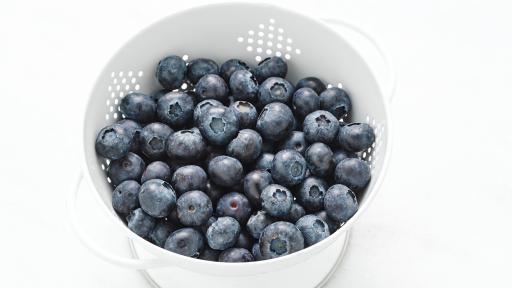New Research Examines Blueberries’ Effect on Cardiometabolic Health in Adults with Metabolic Syndrome
FOLSOM, Calif. – May 29, 2019 – A new research study published in the American Journal of Clinical Nutrition found that participants with metabolic syndrome who consumed the equivalent of one cup of fresh blueberries, given as 26g of freeze-dried blueberries, showed clinically relevant changes in measures of heart health. The study, “Blueberries improve biomarkers of cardiometabolic function in participants with metabolic syndrome – results from a 6-month, double blind, randomized controlled trial,” was conducted at the University of East Anglia in the United Kingdom in collaboration with Harvard T.H. Chan School of Public Health and other UK institutions.
The study found that intake of the equivalent of one US cup per day of blueberries (given as 26g freeze-dried blueberries) resulted in clinically significant improvements in heart health measures, particularly markers of vascular function (blood flow and elasticity of the blood vessels by measuring endothelial function and arterial stiffness). Improved endothelial function and reduced arterial stiffness are associated with a reduced risk of cardiovascular events such as heart attack and stroke.i Importantly, the observed increases in nitric oxide bioactivity in the blood provided a potential mechanism for the endothelial function benefits observed.
NEW RESEARCH EXAMINES BLUEBERRIES’ EFFECT ON CARDIOMETABOLIC HEALTH IN ADULTS WITH METABOLIC SYNDROME @blueberry411 Tweet
View Recipes
Savory Blueberry Pizza Blueberry Salad Flatbreads Farro Blueberry Salad Blueberry Oat Smoothie Easy No-Bake Glazed Blueberry Oat Bars Salmon and Blueberry Salad with Red Onion VinaigretteIntake of one cup of blueberries per day also resulted in significantly increased HDL-C levels, also known as “good cholesterol,” compared to the placebo. Additional lipid biomarkers researched in the study support these findings, such as significant increases in HDL particle number and APO-A1 levels, which are other predictors of heart disease risk.
Insulin resistance, pulse wave velocity, blood pressure, and other lipid levels (including total cholesterol) were unaffected by any of the interventions. There were also no observed clinical benefits from the intake of one-half cup of blueberries in this at-risk participant group.
Over a six-month period, 115 participants (78 men and 37 women) between the ages of 50 and 75 with metabolic syndrome, were randomly assigned to receive one of three daily treatments: 26g freeze-dried blueberries (the equivalent of one US cup/d); 13g freeze-dried blueberries (the equivalent of one-half US cup/d); or a placebo powder matched for color, taste and consistency. All study subjects were instructed to limit intake of other anthocyanin (the main natural flavonoid constituent present in blueberries) containing foods to one portion per week and other foods known to modify vascular function. Participants also refrained from blueberry intake beyond the assigned daily treatments.
Metabolic syndrome is a group of risk factors which includes low levels of HDL-C, or “good cholesterol,” high blood pressure, increased abdominal obesity, high triglyceride levels, high blood pressure and high fasting glucose levels that raises risk for heart disease and other health problems, such as type 2 diabetes and stroke.ii It represents a health challenge that impacts more than one-third of the U.S. population. According to the Centers for Disease Control and Prevention, the percentage of Americans living with metabolic syndrome substantially increased from 25 percent between 1999 and 2006 to 34.2 percent between 2007-2012.iii
“The results of this study provide the first evidence from a long-term study examining the impact of blueberry intake on clinically relevant measures of cardiometabolic health,” said Aedin Cassidy, Ph.D., Head of Nutrition & Preventive Medicine Department and Chair of Nutritional Biochemistry at Norwich Medical School, University of East Anglia and the study’s lead investigator. “While the conclusions drawn are from a single study that cannot be generalized to all populations, the data add weight to the evidence that a dietary intervention with a realistic serving of blueberries may be an effective strategy to decrease important risk factors for heart disease.”
The research was funded by the U.S. Highbush Blueberry Council (USHBC). The USHBC had no role in study design, data collection, data analysis, data interpretation, or writing of the study. For more information on blueberry nutrition research visit blueberrycouncil.org/health-professionals/health-research/.
About the U.S. Highbush Blueberry Council
The U.S. Highbush Blueberry Council is an agriculture promotion group, representing blueberry growers and packers in North and South America who market their blueberries in the United States and overseas, and works to promote the growth and well-being of the entire blueberry industry. The blueberry industry is committed to providing blueberries that are grown, harvested, packed and shipped in clean, safe environments. Learn more at blueberrycouncil.org.
i Landmesser, U. The clinical significance of endothelial dysfunction. Curr Opin Cardiol. 2005 Nov;20(6):547-51.
ii Metabolic Syndrome. National Heart Lung and Blood Institute. https://www.nhlbi.nih.gov/health-topics/metabolic-syndrome. Accessed July 23, 2018.
iii Preventing Chronic Disease. Centers for Disease Control and Prevention.
https://www.cdc.gov/pcd/issues/2017/16_0287.htm. Published September 20, 2017. Accessed July 23, 2018.
Media contact:
Joanne Tehrani, MPH, RD
Padilla
[email protected]
646-218-6036







